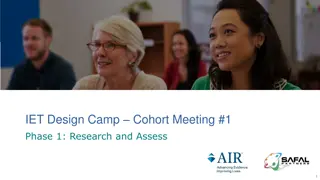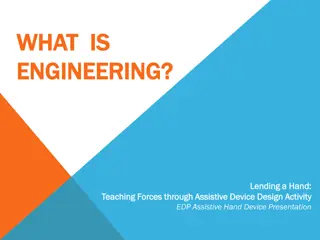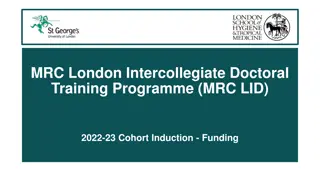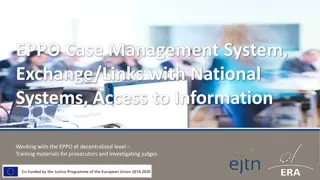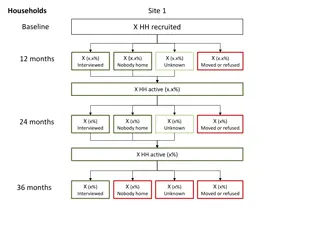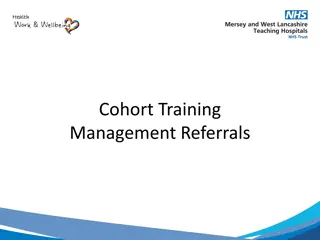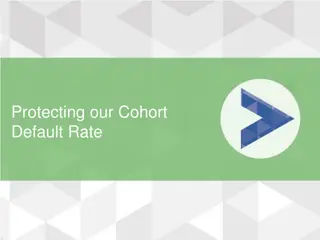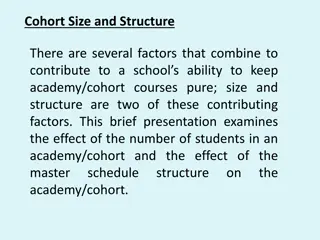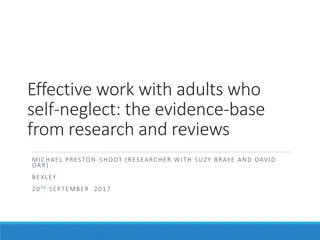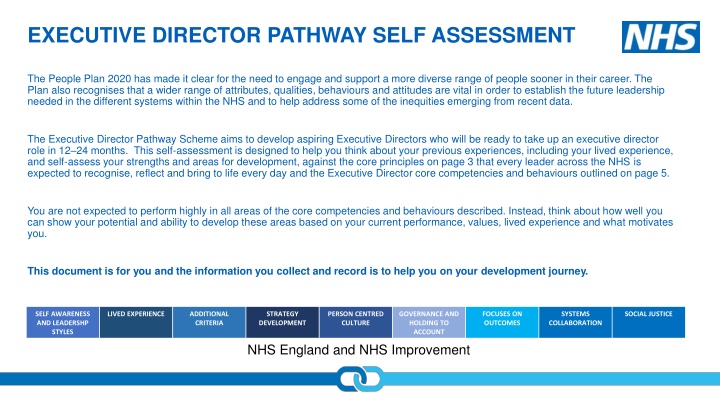
Enhancing Leadership Potential: Executive Director Pathway Self-Assessment
"Explore the Executive Director Pathway Scheme for aspiring leaders in the NHS, focusing on self-assessment against core principles, competencies, and behaviors. Identify strengths, development areas, and prepare for discussions with facilitators to enhance leadership skills."
Download Presentation

Please find below an Image/Link to download the presentation.
The content on the website is provided AS IS for your information and personal use only. It may not be sold, licensed, or shared on other websites without obtaining consent from the author. If you encounter any issues during the download, it is possible that the publisher has removed the file from their server.
You are allowed to download the files provided on this website for personal or commercial use, subject to the condition that they are used lawfully. All files are the property of their respective owners.
The content on the website is provided AS IS for your information and personal use only. It may not be sold, licensed, or shared on other websites without obtaining consent from the author.
E N D
Presentation Transcript
EXECUTIVE DIRECTOR PATHWAY SELF ASSESSMENT The People Plan 2020 has made it clear for the need to engage and support a more diverse range of people sooner in their career. The Plan also recognises that a wider range of attributes, qualities, behaviours and attitudes are vital in order to establish the future leadership needed in the different systems within the NHS and to help address some of the inequities emerging from recent data. The Executive Director Pathway Scheme aims to develop aspiring Executive Directors who will be ready to take up an executive director role in 12 24 months. This self-assessment is designed to help you think about your previous experiences, including your lived experience, and self-assess your strengths and areas for development, against the core principles on page 3 that every leader across the NHS is expected to recognise, reflect and bring to life every day and the Executive Director core competencies and behaviours outlined on page 5. You are not expected to perform highly in all areas of the core competencies and behaviours described. Instead, think about how well you can show your potential and ability to develop these areas based on your current performance, values, lived experience and what motivates you. This document is for you and the information you collect and record is to help you on your development journey. SELF AWARENESS AND LEADERSHP STYLES LIVED EXPERIENCE ADDITIONAL CRITERIA STRATEGY DEVELOPMENT PERSON CENTRED CULTURE GOVERNANCE AND HOLDING TO ACCOUNT FOCUSES ON OUTCOMES SYSTEMS COLLABORATION SOCIAL JUSTICE NHS England and NHS Improvement
EXECUTIVE DIRECTOR PATHWAY SELF ASSESSMENT Work through pages 3, 4 and 5 and record examples of where you think you have had the chance to show the core principles for leadership behaviour on page 3, the experiences on page 4 and aspiring Executive Director core competencies and behaviours on page 5. Use page 6 to reflect and think about the opportunities and experiences you have had. Think about any development gaps that you may have in relation to the areas above and what development you might need. Use page 7 to record your key strengths in relation to the core principles and competency areas. DEVELOPMENT 4 Use page 8 to record the areas that you wish to make a priority for development. STRENGTHS 3 REFLECT 2 DEVELOPMENT DEVELOPMENT EVIDENCE 1 The priority areas that you identify will form the basis of your development discussion with a Pathway Facilitator when you begin the EDP scheme. Their role will be to support you as you progress through your journey to developing your potential. STRENGTHS STRENGTHS REFLECT REFLECT EVIDENCE EVIDENCE NHS England and NHS Improvement
NHS Core Principles for Leadership Behaviours The NHS should be a great place to work for everyone both now and in the future. Leaders are role models, so it is vital that the change we need to see comes from all our leaders, particularly our most senior leaders who need to role model these behaviours We should all experience and demonstrate consistently healthy leadership behaviours. This can be defined as compassionate and inclusive leadership, supported by a culture of lifelong learning and development. We must all commit to promoting social justice and closing gaps in health inequalities, ensuring these principles always guide our decision-making. Every leader, at whatever level across the NHS, should recognise, reflect and bring to life every day six core principles framed as the head, heart and hand of leadership. HEAD Think Purposefully We are inclusive, promote equality and diversity, and challenge discrimination We aim for the highest standards and seek to continually improve HEART Pay attention to how you and others feel We are kind and treat people with compassion, courtesy and respect We can be trusted to do what we promise HAND Be sure to take actions. We celebrate success and support our people to be the best they can be We collaborate, forming effective partnerships to achieve our common goals 3 |
Think of specific examples where you have actively engaged in these activities and behaviours SELF AWARENESS AND LEADERSHIP STYLE Self-aware, inspires and motivates people. Able to engage and the self-knowledge and appetite to drive your own learning and development. Able to connect and influence people. Thorough, curious, and able to come up with ideas. Willing to question the status quo and see future possibilities. Desire to engage senior stakeholders in transformational thinking in a way that adds value to the work of a Board and its sub committees in a future Executive Director role. LIVED EXPERIENCE LEADERSHIP Reflect on your biographical background, including your life experience and personal motivation that can add valuable personal insights. This could be your lived experience as a patient or carer of a service user; engaging with diverse ethnic, cultural, social and economic and cultural groups and communities; experience of gender and women s issues; experiences and challenges of younger people; and those with lived experience of mental health issues and/or living with physical disability. Lived experience recognises that the development and promotion of opportunity for people from diverse backgrounds is different and one size does not fit all. Lived experience leadership can relate to the skills, experience, confidence and networks that people can develop through influencing and participation activities in their communities or personal lives. Personal drivers may stem from insight and motivation from your lived experience and community understanding. There is personal intent and resilience to make a genuine and meaningful difference. EXPERIENCE AND UNDERSTANDING OF THE ROLE OF AN EXECUTIVE DIRECTOR Senior experience from private, public or voluntary sector with insight into the legal duties, liabilities and duties of being an executive director in today s NHS. 4 |
COMPETENCY ASPIRING EXECUTIVE DIRECTOR BEHAVIOURS Strategy Development Contributes to organisational and system resilience. Develops and delivers people centered strategies. Develops an inspiring and engaging vision. Seeks expertise outside functional area. Leads on strategy and system development. Person centred culture Promotes understanding & knowledge sharing, balances the importance of staff and patient focus. Displays genuine connection to patient and staff experience. Emotionally intelligent, resilient, open and compassionate. Builds an inclusive culture and climate, nurturing leadership at all levels, developing the capacity and capability of myself and my teams. Works to improve the quality of working life for all employees, including those from marginalised groups. Speaks up, promotes transparency, supports high standards of integrity, accountability and complies with requirements of relevant regulatory Governance and holding to account and inspection bodies. Leverages knowledge and experience to deliver well balanced judgement, manage risks, identify gaps in assurance and set out clear actions to address them. Demonstrates ability to apply the principles of self-reflection and evaluation to the board and its processes. Engages and encourages multiple input and ideas to develop sound judgements and prioritise patient experience and outcomes. Focuses on outcomes Manages performance and suboptimal outcomes and creates an environment where clinical and operational excellence is sustained. Manages delivery of quality improvement plans and outcomes, budgetary and business plans. System collaboration Actively engages diverse range of stakeholders to build collaboration and whole-system thinking. Actively seeks and includes diverse patient and public opinion to inform system thinking and strategy and manage system level risks. Social justice Holds self and others to account for the impact actions taken to reduce inequalities and improve diversity and inclusion. Takes action and makes decisions that lead to reduction of health inequalities. 5 |
REFLECTIONS / DEVELOPMENT NOTES Thinking about the evidence you have provided above, what is your depth of understanding and level of awareness of each of the areas below and how often do you demonstrate or engage in these attitudes, actions and behaviours SELF AWARENESS & LEADERSHIP STYLE LIVED EXPERIENCE LEADERSHIP SOCIAL JUSTICE STRATEGY DEVELOPMENT PERSON CENTRED CULTURE GOVERNANCE AND HOLDING TO ACCOUNT FOCUSES ON OUTCOMES SYSTEM COLLABORATION ASPIRATIONS Record your motivation for entering the EDP scheme, your career aspirations and anticipated next steps 6 |
STRENGTHS SPECIFIC EXAMPLES OF HOW YOU HAVE DEMONSTRATED THIS 7 |
PRIORITY AREAS FOR DEVELOPMENT SPECIFIC EXAMPLES OF HOW YOU HAVE DEMONSTRATED THIS 8 | You may wish to discuss your strengths and priority areas for development with your line manager and/or sponsor

